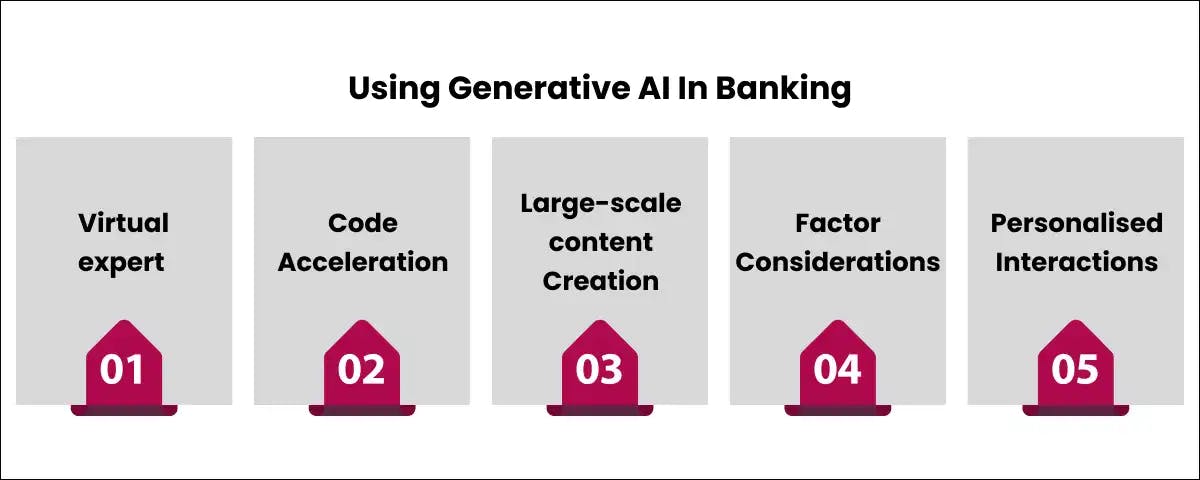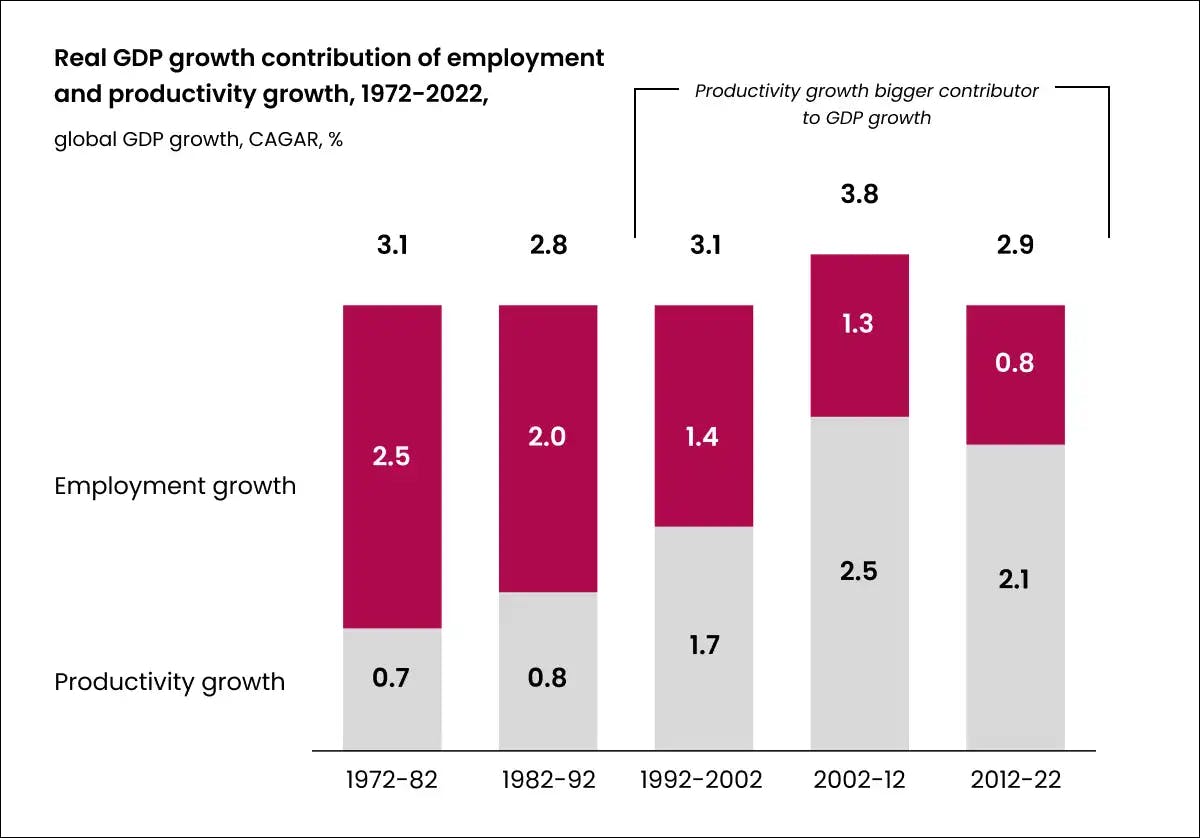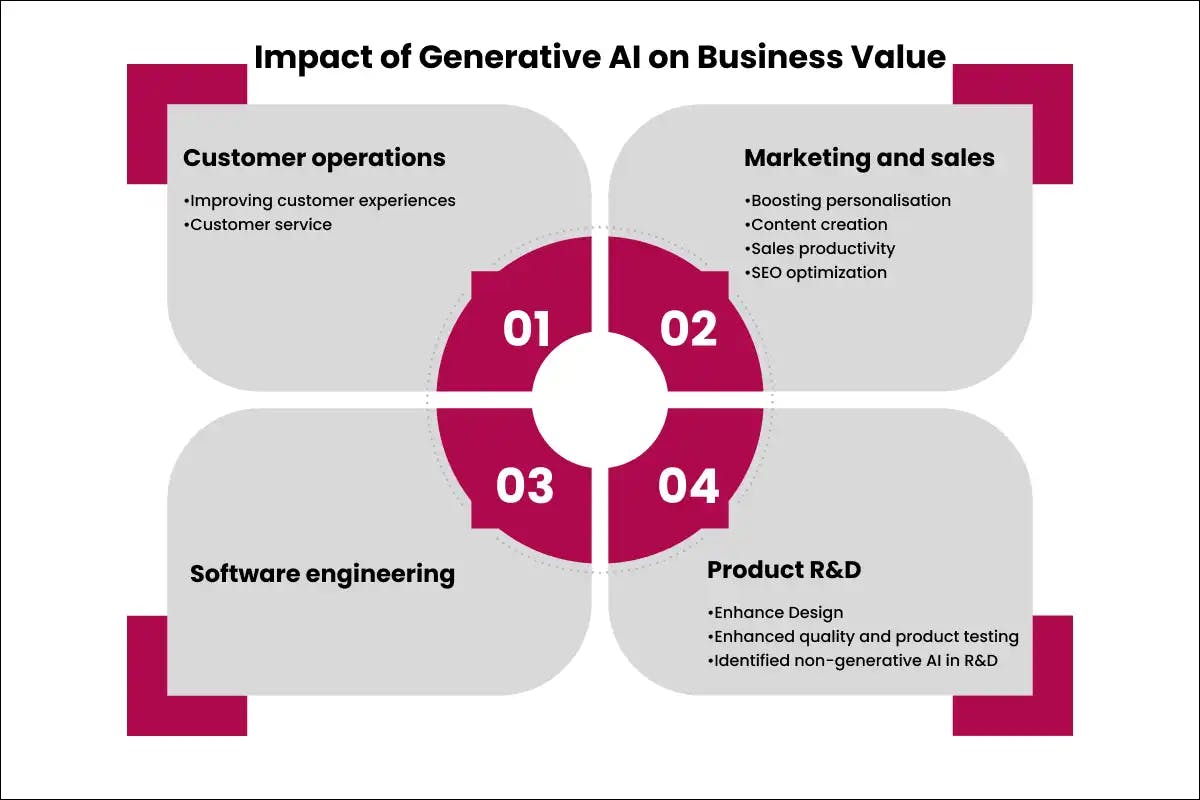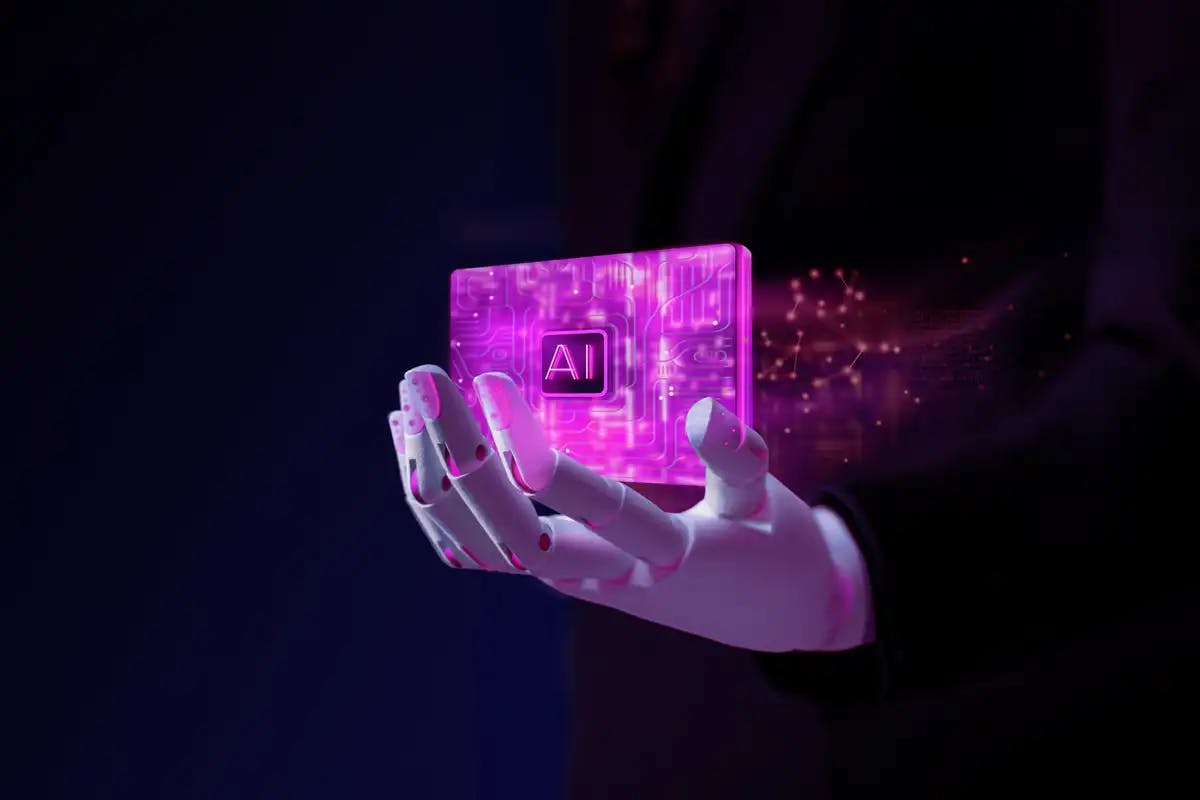In this digital era, Generative artificial intelligence is an advanced version of AI development that is used to create images, text, and so forth. It is nothing but a form of artificial intelligence using GANs and deep learning to create content. With the introduction of GenAI, we have seen a revolutionary change in AI technology capability. Understanding the core of GenAI for the economy and society helps corporations to make critical strategic decisions.
The impact created by using Generative AI on productivity in an IT company could range between 20% - 45% per annum. Also, in the Research and Development sector, Gen-AI manages to increase productivity by 10% to 15%.
In this blog, the statistics about the economic effects of AI on the workforce have been explored along with various generative AI apps in various sectors. Along with this, check out some prospects by AI and how it may affect certain business operations and processes.
Key Insights of Generative AI in Economic
- Boosting the global economy could amount to trillions of dollars
Based on current studies, generative AI could boost the UK's GDP by 15% to 40% and contribute between 2.6 and 4.4 trillion yearly to 63 application cases. Generative AI may cause non-specific software to double in impact. - Generative AI use cases value in customer operations, marketing and sales, software engineering, and R&D
Generative AI can deliver 75% of value in customer operations, marketing and sales, software engineering, and R&D. It can support customer interactions, generate creative content, and draft code based on natural-language prompts across 16 business functions. - Impact on every area of the economy
As a percentage of their revenue, the banking, high-tech, and life sciences sectors may be most affected by generative AI. If the use cases were fully implemented, the technology might, for example, contribute $200 billion to $340 billion in value every year to the banking industry as a whole. - Transform the nature of jobs - Currently, 60–70% of the worker's time can be automated by generative AI and associated technologies. Growing technical automation is a critical skill for 25% of overall work time, and generative AI's improved natural language understanding is fueling this trend. Compared to other forms of work, knowledge work in occupations with higher pay and educational requirements is greatly impacted by generative AI.
- Boost the economy's overall labor productivity - Across the economy, generative AI can greatly increase worker efficiency. By 2040, generative AI might add 0.1% to 0.6% annually to worker productivity, depending on the rate of technology adoption. If combined with all other technologies, work automation can boost productivity growth by 0.2 to 3.3 percentage points annually.
How is the Economy Affected by Generative AI in Business Value
Ever since Gen-AI was introduced at the industrial level it has managed to create a strong impact in improving business value significantly. Here are some key aspects improvised by Generative AI on business values. Have a look.
1. Customer Operations
According to research, the use of generative AI shortened the time needed to resolve an issue by 9% and enhanced issue resolution by a factor of fourteen per hour at a company with five thousand customer service representatives.
Additionally, it resulted in a 25% decrease in agent attrition and requests to meet with management. This is because AI support allowed less experienced agents to communicate in ways similar to those of their more skilled counterparts.
Examples of the operational gains that generative AI can provide for particular use cases are as follows:
- AI reduced response times by providing help and suggestions for immediate action.
- Increase revenue since AI can identify deals and suggest products based on the preferences of customers. Through learning from customer conversations, identifying areas needing improvement, and offering assistance to agents.
- According to estimates, productivity increases from generative AI to customer service tasks could account for somewhere between 30 and 45 percent of present function costs.
2. Marketing and Sales
Rapid use of generative AI has been observed in marketing and sales roles, where text-based messaging and large-scale customisation are important. Customised communications in GenAI technology can be created to match the interests, preferences, and behaviours of individuals.
Additionally, it can complete jobs like writing preliminary versions of product descriptions, headlines, slogans, and social media posts for brands.
- Efficient and effective creation of content
Using generative AI, the duration of time required for ideation and content drafting may be significantly reduced saving a significant amount of time and effort.
- Enhanced use of data
Generative AI can assist marketing operations in overcoming these obstacles by identifying and synthesising trends, important drivers, and market and product opportunities from unstructured data sources including social media, news, and academic research. - SEO optimization
Using search engine optimization for technical marketing and sales components, generative AI can assist marketers in achieving improved conversion rates and reduced costs.
According to research estimates, generative AI might increase sales productivity by three to five percent of current global sales expenses and the overall cost of marketing will rise by 5% to 15%.
3. Product R&D
- Enhance Design
Product designers may reduce costs by selecting and using materials more effectively with the aid of generative AI. - Enhanced quality and product testing
Incorporating generative AI into the generative design can reduce complex system testing time and produce a higher-quality product. - Identified a new case of non-generative AI in R&D
The phrase fresh case of non-generative AI in R&D refers to the use of AI technology that is not based on generating new content or data but rather on analysing and processing existing information. This approach is being used in research and development to explore new ways of applying AI to solve complex problems, improve processes, and make discoveries. It could involve using AI to analyse existing data sets, optimise processes, or develop new technologies.
4. Software Engineering
An internal McKinsey empirical study found that software developers who use generative AI technologies quickly reduced the time needed to build and refactor code. In addition, the engineers reported higher levels of contentment, flow, and enjoyment from their work. Code quality and IT architecture could be improved by generative AI, which could boost productivity throughout the IT value chain.
Impact of Generative AI on Industrial Functions in 2025
Generative AI can create between $2.6 trillion and $4.4 trillion in value across businesses, based on the 63 application cases examined. Its exact effect will vary depending on many variables, including the distribution and significance of various functions and the amount of money generated by an industry.
1. Generative AI supports key value drivers in retail and consumer packaged goods
Generative AI can boost retail and CPG sectors' productivity by 1.2-2.0% of revenue, automating tasks like supply chain management, marketing, and customer support, and enhancing marketing and sales. Generative AI can be integrated with existing AI solutions to personalise offers, improve marketing and sales, enable AI-driven pricing tools, and integrate applications across the organisation.
Generative AI at work in retail and CPG in the following ways:
- Reimagining how customers engage with you
Generative AI can improve consumer experiences in industries like apparel, cosmetics, and food by testing ideas and models through market data. Retailers can gain a competitive edge by developing applications that offer a next-generation experience, such as chatbots for ingredient selection and meal preparation. This technology can also enhance customer value management, customer satisfaction, and brand loyalty. Generative AI offers retailers opportunities to cross-sell, upsell, collect insights, and increase their customer base, revenue opportunities, and marketing ROI. - Accelerating the value-creation in significant fields
By facilitating copywriting, generating innovative ideas, speeding up consumer research, and accelerating content analysis, AI tools can improve marketing and sales. This ultimately increases awareness and sales conversion rates. - Quick resolution and enhanced customer service concepts
The growth of e-commerce emphasises the importance of effective customer relations. Retailers may enhance chatbot capabilities by using generative AI and AI technologies. This will allow chatbots to replicate human agent interactions and automate routine chores, freeing up more time for complicated customer problems.
Considerations of AI for retail and CPG companies
To optimise the value of generative AI, retail and CPG executives should take into consideration several aspects when incorporating the technology:
- External deduction
A higher quality control standard is now necessary due to the growing need to determine if content generated by generative AI is based on fact or inference. - Aggressive attacks
There is an increased range of capability security vulnerabilities and privacy hazards associated with foundation models, as they are a prime target for attacks by hackers and other bad actors.
Companies will need to implement new quality checks for procedures like customer reps, and emails and carry out more thorough quality checks, made feasible by AI-assisted processes for things like product design, to address these issues.
2. Why could banks realise the significant value of Generative AI in the Banking Sector?
The knowledge technology-driven banking sector has already profited greatly from earlier uses of artificial intelligence in areas like marketing and customer operations.
Using Generative AI In Banking
Banks are utilising generative AI solutions like ChatGPT and industry-specific solutions for software and knowledge applications, demonstrating capability benefits in three key areas.

- A virtual expert to improve employee productivity
Generative AI bots are being developed by Morgan Stanley and European banks to monitor customers, provide technical assistance, and improve customer experience, while also reducing back-office costs. - Code acceleration speeds up software delivery and reduces tech debt
Software development is aided by generative AI tools that draft code based on context, automatically generate and review code tests, optimise legacy framework integration, and review code to find errors, all of which lead to robust and effective code. - Large-scale creation of customised content
Generative AI tools can streamline content generation, create personalised marketing and sales content, automate model documentation, identify missing documentation, and scan regulatory updates for alerts. - Factors for banks to consider
Banks should consider factors like regulation, end-user type, work automation level, and data constraints when integrating generative AI into operations. Regulations vary from unregulated to heavily regulated processes, and end user's expectations and familiarity with AI vary. AI agents could act autonomously or as co-pilots. - Generating Highly Personalised Interactions
With its ability to understand context and language, generative AI can power conversational banking through chatbots and voice assistants. It makes tailored chats that provide tips on money matters, suggest products, and offer help based on each user's needs and likes. The friendly talks promote better engagement and satisfaction.
3. Pharmaceuticals and medical products could see benefits across the entire value chain
- Pharmaceuticals and medical items using generative AI
By reducing the number of possible compounds for a given situation, the huge amount of data that generative AI can process and model can greatly accelerate drug discovery and AI can increase productivity in the medical industry. - Boost the preliminary screening's automation
Researchers can automate the screening of compounds for particular pharmacological effects by using foundation models in lead identification for drug development. This enables a more accurate grouping of related pictures, opening up more interesting compounds for additional investigation. - Improve the indication finding
First, using real-world data, researchers map the clinical events and medical histories of the patient group, including possible diagnoses, prescribed drugs, and conducted operations.
By employing this strategy, pharmaceutical companies have completed Phase 3 studies for five of the top indications, greatly expediting the development of new drugs. By employing this method, pharmaceutical companies have completed Phase 3 studies for five of the top indications, greatly expediting the development of new drugs.
The Future Impacts of Generative AI on Economic Growth
In the recent past, the anatomy of work culture has been dramatically changed by the establishment of AI technology. Generative AI which evolved from AI tech has created a deep impact on work activities and other business operations. Take a look at how Gen-AI increases the work activity potential.
- Accelerated the capability of Automation
The analysis considers the time, cost, and diffusion of technological solutions for automating work activities, comparing them to human labor in various occupations and countries. Generative AI has significantly accelerated the adoption of automation scenarios due to its enhanced technical automation.
Generative AI could potentially automate tasks like test preparation and student evaluation for postsecondary English language and literature teachers, allowing them to focus on other tasks like guiding class discussions or tutoring students.
- Generative AI’s impact on knowledge work
It is expected that generative AI will have a substantial impact on knowledge work, especially on collaborative and decision-making tasks, which until then had the least capability for automation.
The quick rise in automation capability can be ascribed to generative AI's ability to comprehend natural language and use it for a variety of activities. A median level of human comprehension of natural language is required for around 40% of the tasks performed by economic workers.
Many job tasks, including supervision, documentation, human interaction, and communication, could be automated with the help of generative AI. The pace at which work is changing is accelerating in fields like technology and education, which were formerly thought to have significant automation potential.
Generative AI is expected to significantly transform the work of higher-wage knowledge workers due to advancements in their previously immune activities to automation.
- Generative AI could propel higher productivity growth
Between 2012 and 2022, the global economy grew more slowly, mostly as a result of COVID-19 and long-term structural issues including aging populations and falling fertility rates.
From 1992 to 2022, the main factor driving economic growth was productivity, which is calculated as output divided by input. But since then, as productivity growth has slowed in tandem with declining employment growth, economists and policymakers have been left perplexed.
Together with other technologies, generative AI can increase productivity growth, offset job losses, and promote economic expansion. Between 2023 and 2040, the automation of individual work tasks might enhance global economic output by 0.2 - 3.3% per year, with generative AI accounting for 0.1 - 0.6 percentage points of this increase but only if individuals impacted by the technology moved to jobs in 2022 that somewhat matched their production levels.
Considerations of Generative AI for Businesses and Society
- Companies and business leaders
Risk management strategies for businesses looking to use generative AI can increase its capability benefit. It draws attention to the changing nature of the workforce's jobs & skill sets, and businesses' responsibility to guard against unfavourable use cases. Additionally, the necessity of openly sharing experiences with society and the government. - Workers, consumers, and citizens
Individuals should be concerned about generative AI's impact on their lives and livelihoods, while companies can assess its impact. Balancing convenience with workplace impact and allowing citizens to voice decisions about AI (Artificial Intelligence) deployment is a must.
Primarily, AI functions as a tool for optimising business processes and making product recommendations more accurate. With the increase in development of generative AI, the prediction is to greatly increase the total impact of AI, creating trillions of dollars in revenue per year and revolutionising the workforce.
Conclusion
Generative AI's sudden widespread adoption in 2022 sparked a surge in deployment, integration, and play among companies and consumers. To beat the competitive market, businesses want to adopt Generative AI models to generate useful data, responses, and so forth.
The capability of generative AI to improve business operations, spur economic growth, and change the nature of employment and society's purpose is better understood because of this research. Collaboration between companies, lawmakers, consumers, and individuals is a must to bring value to economic growth and also minimise its impact on livelihoods.
At Codiste, we have gained expertise in the AI generation field. Our teams have deep knowledge of the latest AI models like DALL-E, GPT-3, and more. We use these to craft future-ready apps and digital platforms. We're always studying and learning, so you get the most modern AI tools straight to your business needs. As a forward-thinking partner, we think about ethics in everything we do.
Reach out to us today to discover how our Generative AI development services can modernise your business while honoring human values.









